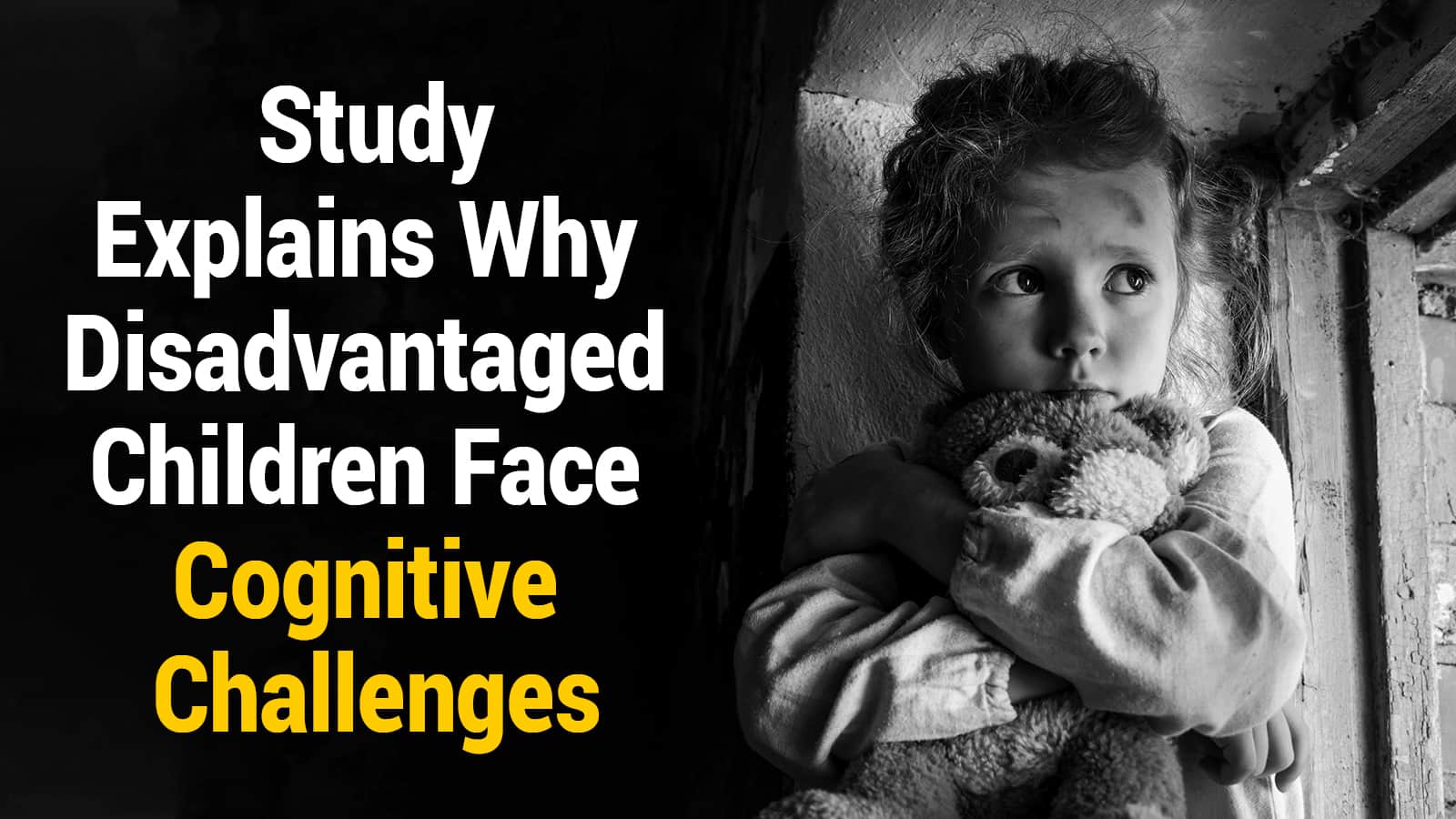A new study shows that disadvantaged children have a heightened risk of developing cognitive and behavioral challenges. Researchers found that children raised in poverty have more physical and mental stress. These effects even last into early adulthood, compounding the difficulties that come with daily life.
Many prior studies have analyzed the physical effects of childhood poverty. The research also discovered an association between mental health and socioeconomic classes. However, the authors of this study took a different approach, wanting to see if childhood poverty affects people into adulthood. If it did, how?
Deanna Barch, chair and professor in the Department of Psychological & Brain Sciences in Arts & Sciences at Washington University, St. Louis, led the study. She collaborated with her colleague Joan Juby, MD, the Samuel and Mae S. Ludwig Professor of Child Psychiatry in the School of Medicine.
About the study of the cognitive challenges faced by disadvantaged children
To conduct the research, Luby, March, and other colleagues, collected data from families who volunteered for the study. Researchers followed the families through early adulthood, which included 216 preschoolers, for 17 years. Researchers took brain scans of participants throughout the study period to determine how low socioeconomic status affected brain development. They then used this information to analyze relationships between preschool socioeconomic status (SES) and early adulthood cognitive, social, academic, and psychiatric outcomes.
The results were published July 14, 2021, in the journal Biological Psychiatry: Cognitive Neuroscience and Neuroimaging.
Barch said this:
“First and foremost: yes. Early poverty sadly continues to predict worse outcomes in all of these domains.”
Researchers found that even if a child’s socioeconomic status changes before adulthood, brain development remains impaired.
“We think poverty and all of the things associated with it” — such as stress, inadequate nutrition, less access to health care — “impact brain development,” she said. “If we can prevent poverty, we can help circumvent some of these negative outcomes.”
For the research, the team gathered participants, including primary caregivers and their 3- to 5-year-old children. To increase accuracy, they used a specific questionnaire to recruit more children with symptoms of depression. This way, the researchers could differentiate between the effects of poverty and preexisting mental disorders.
Next, the researchers interviewed the children once a year. When they turned sixteen, they tested the young adults for cognitive function, psychiatric disorders, high-risk behaviors, educational outcomes, and social function. During the seventeen-year study, volunteers also underwent five brain scans that measured local and global brain matter volumes. This information allowed researchers to determine whether brain development mediated risks for poverty.
In other words, do changes in the brain due to childhood poverty cause lasting effects into adulthood?
Then, the team controlled for variables including preschool psychopathology along with significant life events. Researchers found that socioeconomic status in preschool impacted cognitive function, high-risk behaviors, social function, and academic performance 13+ years after the children joined the study.
Brain health and disadvantaged children
The research team performed brain scans, providing physical proof of poverty’s toll on young children. Children living below the poverty line in preschool had smaller volumes of subcortical brain regions such as the hippocampus, caudate, putamen, and thalamus.
“But also they had less growth in these regions over time,” Barch said. “So they’re starting out smaller and not growing as much.”
In scientific research, subcortical regions often get overlooked since they’re not directly responsible for a specific cognitive or emotional function. Instead, they act as messengers, sending information to other brain regions where higher-order functioning takes place.
“The thalamus, for example, doesn’t always get a lot of love in the literature,” Barch said, “but it’s a very important relay structure that helps coordinate the transfer of information from the brainstem to higher-order cortical areas. These brain regions are like important waypoints on the highway of the brain.”
These areas of the brain are susceptible to environmental factors like pollution and inadequate nutrition. These factors disproportionally affect disadvantaged children and adults.
The silver lining in the new research
However, researchers want to stress that childhood poverty doesn’t necessarily determine a person’s future. While these children may face more setbacks, they can still overcome them with the right support and resources. In fact, in future research, Barch wants to test this theory by tracking the effects of the recent child tax credit on children’s brain development.
“Plenty of kids have wonderful outcomes despite growing up in poverty,” Barch said. “Growing up in poverty makes things harder for people, but it is preventable. That’s the good news: We can do something about this.”
The study actually helped the participants as much as the researchers. Simply by showing up over the years through adolescence and even after becoming young parents, in some cases, the volunteers gained valuable insight.
“It’s pretty amazing,” Barch said. “They have made a huge contribution to science.”
This research shows that early life circumstances don’t always determine a person’s fate. With the right support and resources, disadvantaged children can have better outcomes in life. This doesn’t downplay the struggles they face but rather focuses on turning these obstacles into opportunities.
It’s also important to remember that the brain can adapt over time, also known as neuroplasticity. As a person gains more knowledge and experience, their brains adapt to these new inputs and situations. So, by feeding the brain positive information and having a growth mindset, a person can actually rewire their neural pathways. Pretty cool, right?!
Final thoughts on the study proving that disadvantaged children may face cognitive impairments
A new study by researchers from Washington University shows that impoverished children face significant cognitive challenges. Compared to children of a higher socioeconomic status, disadvantaged children have smaller volumes in critical brain regions. This can impact them even into young adulthood.
However, the study also shows that these children can have bright futures with the right resources and support. A strong support system, educational opportunities, and financial aid can positively impact disadvantaged children and their families. Every nation should strive for equality, and by eradicating poverty, we’ll be one step closer to achieving it.


















